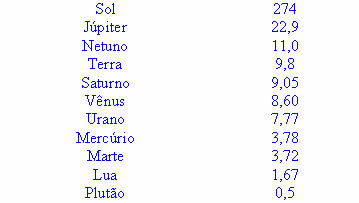It is common to hear the following sentences: “I weigh 85 kg”, “I am overweight”, “The ideal weight for your height is 75 kg”. Popularly, we are associating the measure observed when we climb a scale with the word weight. This argument used by most people is totally wrong. The measure obtained by stepping on the scale should be called mass, not weight. See the correct definitions for weight and mass:
Weight it is an “invisible” force that draws bodies to the earth's surface. Thus, our weight varies according to the value of gravity, different from other planets and natural satellites in the solar system.
Mass is the amount of matter present in a body. We say that a person's mass is the same everywhere.
For example, let's imagine that a person has a mass of 60 kg. According to this measure, we can say that it has a weight equal to approximately 588 N (Newton). Let's understand the value of this weight:
When we refer to weight, saying that its value depends on gravity, then we are putting into practice Newton's 2nd law, demonstrated by the mathematical formula: P = m * g. In this expression, we have to:
P: weight
m: mass
g: gravity acceleration
Continuing with one more example, let's determine the weight of a person with a mass equal to 57 kg, on the earth, moon and other planets. But for that, we need to know the accelerations of gravity that are present in the following table:

A person with a mass equal to 57 kg has the following weights:
In the land
P = m * g → P = 57 * 9.8 → P = 558.6 N
On the moon
P = m * g → P = 57 * 1.67 → P = 95.19 N
on jupiter
P = 57 * 22.9 → P = 1 305.3 N
on pluto
P = 57 * 0.5 → P = 28.5 N
In the sun
P = 57 * 274 → P = 15 618 N
by Mark Noah
Graduated in Mathematics
Brazil School Team
Source: Brazil School - https://brasilescola.uol.com.br/matematica/peso-x-massa.htm

